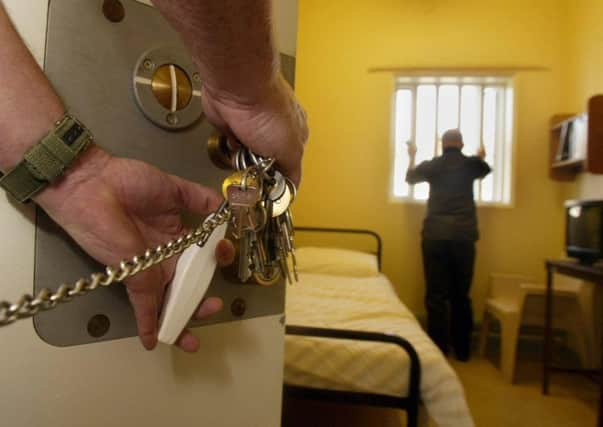Dani Garavelli: Talking cure can transform life behind bars


McConnell is reading this letter at the launch of the service’s new suicide prevention strategy, Talk to Me, not as a self-serving abdication of responsibility for the welfare of prisoners, but to emphasise the challenges involved in identifying and supporting those at greatest risk of self-harm.
These challenges also exist in the community. But they are intensified in jails where the number of people with mental health problems is disproportionately high. In jail, the fear of being identified as vulnerable (and therefore as easy prey) and of being placed in a safer cell (one stripped of all ligature points) may also deter prisoners from disclosing suicidal thoughts.
Advertisement
Hide AdAdvertisement
Hide AdSince 1998, the SPS has been using a suicide prevention strategy called Act and Care (updated and renamed Act2Care in 2005). The SPS says this strategy has reduced the number of prison suicides though there has been an unexplained spike this year. Since January, there have been 11 (though most of these are yet to be officially confirmed as suicides by Fatal Accident Inquiries). This rate is much higher than the UK national suicide rate (around 11 per 100,000 people) and slightly higher than the rate in prisons in England and Wales, which this year saw 102 suicides in a prison population of 80,000. Scotland has about 7,500 prisoners.
Investigations are ongoing as to the sudden rise in Scottish jails (from four in 2015 and eight the year before). However, in 2014, the Ferret news agency’s analysis of FAIs into 34 prison suicides since 2009 uncovered flaws in the implementation of Act2Care including communication breakdowns between courts and prisons, inadequate staff training and a failure by prison staff to follow procedures and properly record information.
In 2014/15, four FAIs into deaths in custody also highlighted areas of concern: the difficulty staff faced accessing all relevant information when making risk assessments at reception; a lack of information as to how families could raise their fears over a relative’s state of mind; and the importance of officers obtaining a verbal response from prisoners whenever they locked or unlocked their cells.
The catalyst for the latest overhaul of its suicide prevention strategy was the transfer of responsibility for healthcare in prison from the SPS to the NHS in 2011. Talk to Me, which will replace Act2Care in all Scottish jails tomorrow, encourages a shift in emphasis from the use of safer cells, which are not conducive to better mental health, to the use of therapeutic interventions and other out-of-cell activities.
The policy’s guiding principle is that suicides can only be prevented when the whole prison community, including those in custody, work together to identify those at risk and encourage them to accept help and support. It promotes greater family involvement, with relatives actively encouraged to raise concerns with prison staff.
Efforts have also been made to address the specific shortcomings identified in the FAIs. Now, anything that emerges during initial risk assessment or is agreed at case conferences will be passed on to relevant staff, and through-care has been improved so that those deemed to be at risk will be referred to the appropriate outside agencies on leaving prison.
The new policy is in harmony with the SPS’s more enlightened approach over the past few years. While, south of the border, jails continue to be seen primarily as a place of punishment (with a slight shift when Michael Gove was justice secretary) the SPS has been more focused on rehabilitation and on placing prisons at the heart of communities.
Conscious that strong family links reduce recidivism, prisons have worked at improving the bond between inmates and their children and on encouraging them to take part in work and education programmes.
Advertisement
Hide AdAdvertisement
Hide AdOf course, designing a robust suicide prevention policy is only the start. The real test is whether or not it can be successfully implemented. And here, doubts are already forming. Will prison officers – some of whom continue to see their role as one of population control – embrace a more open relationship with their charges? Will training and awareness-raising be adequate so everyone involved understands how the policy is supposed to work?
And will it be properly resourced? Last week, a report from the Royal College of Nursing Scotland found prison nurses were still reporting low morale five years after the handover. Just under half of those who responded (45 per cent) thought nurse-led primary care services were meeting the healthcare needs of people in prison, with 40 per cent saying they were not. Where does that leave a strategy that relies on the expertise and availability of mental health nurses?
A final conundrum for the SPS and society is that the better prisons become at dealing with mental health problems, the more likely they are to be used as dumping grounds for vulnerable people who are unable to access the support they require in the community. This is thought to be one of the reasons a range of policies aimed at reducing the prison population has had little impact so far.
Despite these reservations, there is much to be positive about, particularly the extent to which the SPS appears eager to engage with outside agencies such as Breathing Space, which provides a confidential listening service, the Samaritans, which selects and trains prisoners to offer peer support, and Families Outside.
Their optimism is reassuring because there’s so much at stake. If Talk to Me succeeds in getting prisoners to open up about their negative feelings, then not only will more suicides be stopped, but jails will become healthier environments better equipped to help damaged people build new futures.